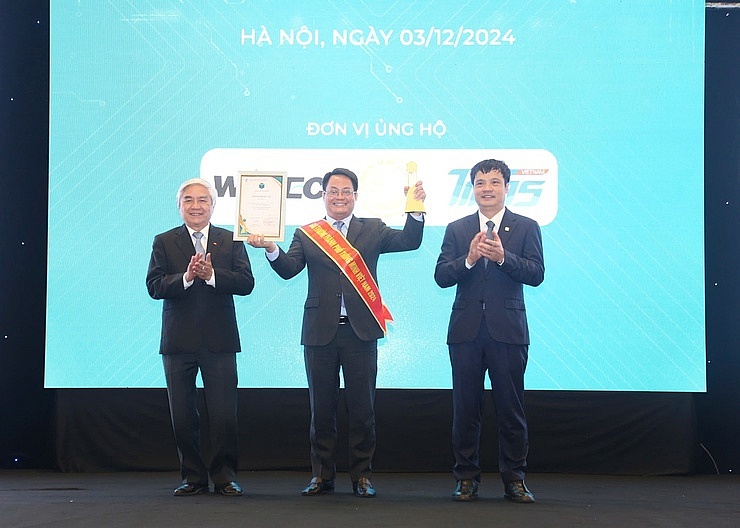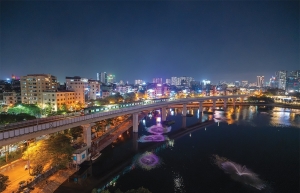Hanoi’s smart city initiatives claims top awards
The awards ceremony, organised by the Vietnam Software and IT Services Association (VINASA), took place on December 3 as part of the Vietnam-Asia Smart City Summit 2024.
The two-day event, held at the National Convention Centre in Hanoi, attracted stakeholders from across the region to discuss advancements and opportunities in smart city development.
This year’s Vietnam Smart City Awards attracted 70 nominations, which underwent a rigorous selection process that included initial screenings, presentations, and final evaluations. A total of 19 awards were presented, with 10 given to cities and nine to technological solutions. One city also received special recognition for its efforts in advancing smart city initiatives.
Hanoi's recognition at the awards, for “Smart Infrastructure City” and “Smart Public Services City”, underscores its impressive achievements in implementing cutting-edge technologies to improve urban management and public services, the organisers said.
 |
| Nguyen Viet Hung, director of the Hanoi Department of Information and Communications, received the awards on behalf of the city. Photo: Vietnam-Asia Smart City Summit 2024 |
According to VINASA, Hanoi has made remarkable progress in digital infrastructure and public service delivery. The city has activated e-identification accounts via the VNeID app for nearly all officials, civil servants, and employees, achieving a rate of 99.99 per cent.
It has also successfully extended 4G mobile network and fibre-optic infrastructure coverage to all communes, wards, and townships, reaching 100 per cent. The rate of smartphone penetration has climbed to 90 per cent, and broadband mobile subscriptions now exceed 121 per cent.
Hanoi aimed to install approximately 2,000 5G stations by the end of 2024, further enhancing connectivity across the capital. Currently, Hanoi hosts 16 of the nation’s 33 data centres.
In addition to these accomplishments, Hanoi is one of five cities nationwide tasked with piloting a centralised public administration service centre model. As the first to put this model into operation, the capital has set a precedent for improving administrative efficiency and accessibility.
Alongside Hanoi, other notable winners included Danang and Ho Chi Minh City, which were recognised for their leadership in smart urban development. Danang secured three awards: "City with an Innovative Startup Ecosystem”, “City with Smart Operations and Management”, and “City with Smart Environmental Management”.
Additionally, Danang was named “Outstanding City for Smart Urban Development in Vietnam 2024”, marking the fifth consecutive year it has received this honour.
Ho Chi Minh City, along with its Thu Duc area and Tay Ninh city, were recognised in the "Smart Operations and Management" category. Meanwhile, Cao Lanh City, a first-time participant, earned the “Smart Education City” award.
VINASA noted that provinces demonstrating strong implementation of smart city solutions have shown marked improvements. Cities like Hanoi, Danang, Ho Chi Minh City, Thu Duc, and Tay Ninh have emerged as leaders in this space, with Danang consistently maintaining its position at the forefront of smart city development. The city’s active participation since the awards’ inception has set a benchmark for others to follow.
Beyond recognising city-specific achievements, the awards also highlighted innovations in technology that contribute to the smart city ecosystem. Among the winners were SCS Cybersecurity Corporation’s SafeGate Office firewall solution, Rang Dong Light Source and Vacuum Flask JSC’s smart lighting solutions, MobiFone Telecommunications Corporation’s Smart Travel platform, and Cads Software JSC’s 1BUSINESS enterprise management solution.
Dr. Nguyen Quan, former Minister of Science and Technology and chairman of the Awards Committee, commended the high quality of nominations.
“The pre-selection council carefully evaluated and selected nominees deserving of recognition. The organisers have timely introduced adjustments, incorporating green criterion into the programme to align with the dual goals of the national digital transformation strategy – digitalisation alongside environmental sustainability. All entries were assessed based on comprehensive criteria of smartness, sustainability, and innovation,” Quan said.
Discussing the future trajectory of the awards, Quan added that Vietnam’s digital transformation efforts are still in their initial phase.
"In the coming years, the organising committee will further enhance the criteria, impact, and value of the awards, enabling participants to better appreciate the dynamism of the smart city field and encouraging their participation with even more outstanding achievements," Quan said.
 | Hanoi eyes semiconductor industry growth with new strategic initiatives Experts have emphasised Hanoi's potential to become a key player in the semiconductor industry, leveraging new legal frameworks and strategic investments to attract global tech companies and foster local innovation. |
 | North Hanoi Smart City strives to become first carbon-neutral urban area Property development players have signed a deal to help make North Hanoi Smart City the first carbon-neutral urban area in Vietnam. |
 | Hanoi has long road to travel in becoming a smart city Over the past few years, Hanoi has actively implemented digital transformation solutions with the aim of becoming a smart city. This is an ambitious project with three key objectives. |
What the stars mean:
★ Poor ★ ★ Promising ★★★ Good ★★★★ Very good ★★★★★ Exceptional
Related Contents
Latest News
More News
- Kurz Vietnam expands Gia Lai factory (February 27, 2026 | 16:37)
- SK Innovation-led consortium wins $2.3 billion LNG project in Nghe An (February 25, 2026 | 07:56)
- THACO opens $70 million manufacturing complex in Danang (February 25, 2026 | 07:54)
- Phu Quoc International Airport expansion approved to meet rising demand (February 24, 2026 | 10:00)
- Bac Giang International Logistics Centre faces land clearance barrier (February 24, 2026 | 08:00)
- Bright prospects abound in European investment (February 19, 2026 | 20:27)
- Internal strengths attest to commitment to progress (February 19, 2026 | 20:13)
- Vietnam, New Zealand seek level-up in ties (February 19, 2026 | 18:06)
- Untapped potential in relations with Indonesia (February 19, 2026 | 17:56)
- German strengths match Vietnamese aspirations (February 19, 2026 | 17:40)

 Tag:
Tag:



![[Infographic] AMATA: Industrial and Smart City Developer](https://vir.com.vn/stores/news_dataimages/2026/022026/12/16/croped/amata-industrial-and-smart-city-developer-20260212165823.jpg?260212050401)
















 Mobile Version
Mobile Version